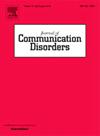Atypical processing of changes in words and pseudowords in children with autism spectrum disorder
IF 2.1
3区 医学
Q2 AUDIOLOGY & SPEECH-LANGUAGE PATHOLOGY
引用次数: 0
Abstract
Objective
The present study explored the neural basis of speech perception in school-aged children with ASD but without language impairments and typically developing control children.
Methods
Event related potentials reflecting stimulus encoding, discrimination, and orientation were recorded to five different speech sound changes (consonant or vowel identity, vowel duration, fundamental frequency, intensity) in carefully matched words and pseudowords. Perceptual discrimination of prosodic changes was assessed with a behavioral test.
Results
Impaired speech sound encoding was found for both word and pseudoword stimuli in children with ASD. Reduced neural discrimination of vowel identity changes, consonant changes in pseudowords and vowel duration changes in both words and pseudowords were found in children with ASD. Also, reduced involuntary attention shifting to changes in vowel duration was found in children with ASD.
Conclusions
Results indicate altered speech-sound encoding and reduced cortical discrimination of and orienting to speech-sound changes in complex word-level speech stimuli in school-aged children with ASD but without language impairments.
Significance
The results support the theories suggesting weaknesses in phonemic processing in ASD.
自闭症谱系障碍儿童词汇和假词汇变化的非典型加工
目的探讨无语言障碍的ASD学龄儿童和典型发育对照儿童言语知觉的神经基础。方法在仔细匹配的单词和假词中记录5种不同的语音变化(辅音或元音同一性、元音持续时间、基本频率、强度),反映刺激编码、辨别和定向的7个相关电位。用行为测试评估韵律变化的知觉辨别。结果ASD患儿对单词和假单词刺激的语音编码均有明显的减弱。ASD儿童对元音同一性变化、辅音假词变化、单词和假词元音持续时间变化的神经辨别能力减弱。此外,在ASD儿童中发现,对元音持续时间变化的不自主注意力转移减少了。结论无语言障碍的ASD学龄儿童在复杂词级言语刺激下,语音编码发生改变,皮层对语音变化的辨别和定向减弱。意义本研究结果支持了ASD在音素加工方面存在缺陷的理论。
本文章由计算机程序翻译,如有差异,请以英文原文为准。
求助全文
约1分钟内获得全文
求助全文
来源期刊

Journal of Communication Disorders
AUDIOLOGY & SPEECH-LANGUAGE PATHOLOGY-REHABILITATION
CiteScore
3.30
自引率
5.90%
发文量
71
审稿时长
>12 weeks
期刊介绍:
The Journal of Communication Disorders publishes original articles on topics related to disorders of speech, language and hearing. Authors are encouraged to submit reports of experimental or descriptive investigations (research articles), review articles, tutorials or discussion papers, or letters to the editor ("short communications"). Please note that we do not accept case studies unless they conform to the principles of single-subject experimental design. Special issues are published periodically on timely and clinically relevant topics.
 求助内容:
求助内容: 应助结果提醒方式:
应助结果提醒方式:


